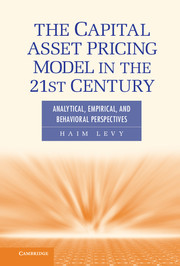Haim Levy is Miles Robinson Professor of Business Administration at the Hebrew University of Jerusalem and Dean of the Academic Center of Law and Business, Israel. The author of hundreds of articles in leading academic journals and about twenty books, he has obtained the ranking of the most prolific researcher in finance in the world covering the forty years through 1986 and the most prolific researcher in finance in the world in the core sixteen finance journals covering the fifty-year period through 2005. A co-author with Nobel Laureates Harry Markowitz and Paul Samuelson, Professor Levy's major research contributions have been to the field of stochastic dominance, which sets forth the criteria for decision making under conditions of uncertainty, in both expected utility and prospect theory paradigms. He has also developed economic models for equilibrium asset pricing in an imperfect market. Professor Levy received the Hebrew University's Prize for Excellence in Research in 1996 and the Emet Prize in 2006. He has served as economic adviser to the Bank of Israel and held a University Professor position at the University of Florida and visiting academic positions at the University of California, Berkeley and the Wharton School, University of Pennsylvania. He received his Ph.D. from the Hebrew University in 1969 and has held a full professorship there since 1976.

